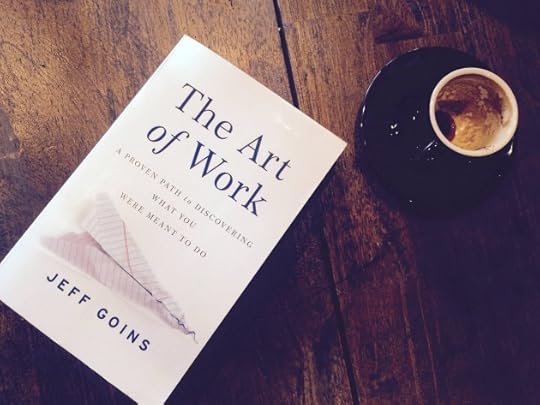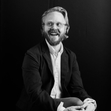Jeff Goins's Blog, page 40
May 25, 2016
105: Redefining What Success Means to Us with Aaron Walker
Living a “successful” life isn’t all it’s cracked up to be. We often believe if we have more money, more recognition, or more significant achievements, then we will feel satisfied. But I can tell you from personal experience, that’s just not true.

Publishing a book, obtaining a promotion, or finally working full-time for yourself will bring you temporary satisfaction, but these good things will not please you forever. This is because, many times, the goals we pursue are about us. But success is about so much more.
I used to believe that pursuing a dream and being successful was only about myself. But I couldn’t have been more wrong. It wasn’t until I got everything I wanted in life that I realized none of it was for me.
This week on The Portfolio Life, Aaron Walker and I talk about why success isn’t measured by what we gain, but rather by whom we influence. There’s no one better to speak fresh truth into this topic than Aaron. He has built multiple successful businesses. But it wasn’t until he experienced a tragic accident that he realized there is more to life than achieving success.
Listen in as Aaron shares what he has learned about living a life of significance and practical steps you can take in leaving a legacy.
Listen to the podcast
To listen to the show, click the player below (If you are reading this via email or RSS, please click here).
Show highlights
In this episode, Aaron and I discuss:
Why we need a reason to get up in the morning
The difference between living a life of success versus significance
Why pursuing success will not satisfy you forever
Whether you have to hit rock bottom to figure out your life
The importance of having people in your life to challenge you
What you need to help you live a life of significance
How to get around the right people
Quotes and takeaways
“We need contentment, not complacency.” —Aaron Walker
“You are the average of the five people you spend the most time with.” —Jim Rohn
“We have to train ourselves to be generous in all areas.” —Aaron Walker
“The answer is always ‘no’ unless you ask.” —Aaron Walker
“Fear missing an opportunity more than failure.” —Aaron Walker
Resources
Free Personal Assessment from Aaron Walker at View from the Top.
Halftime , Bob Buford
Essentialism , Greg McKeown
Mindset , Carol Dweck
The Big Leap , Hendricks Gay
Download the full interview transcript here (pending)
What would you do today if you had no limitations? Share in the comments

May 23, 2016
Join Me for a Free Book Study this Summer
Are you trying to figure out what you’re supposed to do with your life? Maybe you know exactly what you’re meant to do but you feel stuck in a dead-end job looking for the escape hatch? Or like many others, you’re somewhere in between and you want to know if you’re heading in the right direction.
 If this describes you, then I think you will like what I have planned this summer. Many people who read my book, The Art of Work, have asked me questions like, “What now?” or “How do I… ?” So I thought it would be fun to do a live book study for free to help answer these questions and more.
If this describes you, then I think you will like what I have planned this summer. Many people who read my book, The Art of Work, have asked me questions like, “What now?” or “How do I… ?” So I thought it would be fun to do a live book study for free to help answer these questions and more.
I want to invite you to join me for the next eight weeks in this free book study. We will explore the big questions in life, like, “What’s my purpose?” and “How do I know if I’ve found it?” During this eight-week study, we will talk about these things and a whole lot more.
If you’re a writer who wants to go pro, and you need practical steps to get started, this will help.
If you’re an employee who wants to become an entrepreneur, then there will be lessons you can learn to help you make the transition.
And if you want to find greater meaning in your life and work, we can talk about that, too.
I wrote The Art of Work to challenge people to think about their life as an important journey, one in which they have an important gift to share with the world. I also wrote it to encourage you where you’re at in your journey and offer you some practical tools to help you keep moving in the direction of your life’s work.
So if you:
Want to live with a greater purpose,
think you are meant for more than an average life,
and believe your life is not an accident,
Then this free book study is for you!
Here’s how you can join:
Go buy The Art of Work from your favorite retailer (you can see a list here). If you already have the book, then you’re set!
Enter your email address OR your order/receipt number (if you have it) at artofworkbook.com. (If you have already claimed the bonuses, then you will receive an email soon about the study.)
Follow the instructions to get your bonuses, including access to the private Facebook group where I will connect with readers and conduct weekly live video teachings and Q&A.
That’s it!
Ready to get started? Go to The Art of Work book site to make sure you’re signed up. You’ll get an email in a week when we get started on June 1.
Make sure you sign up May 30th so that you don’t miss anything!
Click here to join the free book study, buy the book, and claim your bonuses.

May 18, 2016
103: Balancing Creativity and Business with Paul Jarvis
I used to think working for yourself meant spending all of your time only doing the things you loved. But now I realize there’s more to working for yourself than just doing what you love.
There’s a good tension you will face as a creative between balancing the business and creative side of working for yourself. This struggle will provide you with ongoing opportunities to grow as a professional. Whether you’re a freelance designer, consultant, or author, you must prepare yourself now for this challenge.
This week on The Portfolio Life, Paul Jarvis and I talk about how he handles the tension of creating great work with the business side of things, the importance of fighting fear while doing your best work, and how you can best master your skills and learn new one’s to prepare you for working full-time for yourself.
Listen in as Paul shares what he has learned working full-time as a freelancer and online entrepreneur for nearly 20 years. There’s a lot of wisdom in what he has to say that you don’t want to miss.
Listen to the podcast
To listen to the show, click the player below (If you are reading this via email or RSS, please click here).
Show highlights
In this episode, Paul Jarvis and I discuss:
What you can learn from Paul’s experience navigating the tension between business and creativity
How fear can provide opportunities for personal and professional growth
How to fight the false belief that your best work is behind you
Why you should regularly create new challenges for yourself
Paul’s transition from providing freelance work to becoming an online entrepreneur
The biggest challenge creatives face in making a living for themselves
Why you may need to say no to good opportunities
Whether or not every creative should run a business
How taking on new projects will help you to grow as a professional
Quotes and takeaways
Fear and action can coexist
The only way to be something is to start doing it
You need to spend as much time connecting your work with people as you do making the work
No one is going to push you as hard as you’re going to push yourself
Resources
Paul Jarvis’ personal website
Paul’s Creative Class
Chimp Essentials (Paul’s class on MailChimp)
Download the full interview transcript here
This week only, The Art of Work ebook is available at most retailers for $2.99
What action are you going to take today after listening to this podcast? Share in the comments.

May 16, 2016
This Week Only: Get My Best-selling Book on Finding Your Calling for Only $2.99
This week only, my best-selling book The Art of Work is available at most retailers for only $2.99. On top of that, if you buy this week, you can also get a whole bundle of bonuses for free.

Here’s what you need to do:
1. Buy the book wherever you want
Most American retailers will discount the eBook to $2.99 this week only, but some international retailers may not. (Sorry if this promotion does not apply where you live, but I am unfortunately unable to help with that.) Here are some links to popular sites:
Amazon
BN
Google Play
iBooks
Don’t have a Kindle or eBook reader? No problem! Just use the free Kindle app for your smartphone or computer. It’s great!
2. Claim your free bonuses
The bonus package includes a four-part video course, 10-part audio series, access to private group discussions, and downloadable workbook. All you have to do is go to the book site, enter your email address and receipt or order number, and follow the instructions.
3. Start reading
If you take part in this promotional offer, then you will get an invitation to join me in an eight-week book study. This study will include live video teachings and Q&A for me, absolutely free.
This promotion ends May 22, so be sure to act now if you want the discount.
If you already have the book, you can still get the bonuses (use your zip code if you don’t have your receipt number) and participate in the book study. I’d also love your help in telling a friend or two about this.
Click here to share the love and tweet about this.
Thanks for helping The Art of Work become a bestseller and making it possible for me to continue doing the work I love. I am indebted to you all.
Get The Art of Work and Claim Your Bonuses Here.
How can you best use the upcoming summer months to pursue your calling? What is one step you must take?Share in the comments

May 11, 2016
The Seven Stages of Finding Your Calling
Finding your calling usually isn’t a defining moment of clarity. It’s a hard, long process to discover what you were meant to do with your life that usually involves failure.
Failure is inevitable. It’s also a gift. When you fail, it’s a chance to learn how to move forward, overcome, and take that lesson to the next thing you do. Failure forces you to grow. And those opportunities help you find what you are called to do.
Each step of a calling is difficult in its own way. To find your calling you must walk through seven different stages: awareness, apprenticeship, practice, discovery, profession, mastery, and legacy.
In this week’s episode of The Portfolio Life, join my co-host Andy Traub and me as we walk through the seven stages of pursuing your calling I outlined in my book, The Art of Work.
Listen to the podcast
To listen to the show, click the player below. (If you’re reading this via email, click here).
You can also listen on iTunes or Stitcher.
Highlights from the show
Your life is speaking; you just need to be able to recognize the signs.
Every story of success is really a story of community. We don’t get to where we’re going alone.
Practicing is how you learn what you’re supposed to be spending your time doing.
Pick one thing and do it for the rest of your life so that you can become a master at it.
Our calling is not complete until we begin to share it with others.
Pursuing your calling is a process of awareness, accidental apprenticeship, painful practice, discovery, profession, mastery, and legacy.
Resources
This podcast is only an overview of the process of finding your calling. In The Art of Work, I go into more details on each of these steps and help you look at what they look like in your own life. You can pick up your own copy of the book at ArtofWorkBook.com
Pick up a copy of The Art of Work and submit your receipt at the book site to get $250 in free bonuses. Visit ArtofWorkBook.com now to get started.
Where are you in your journey of finding your calling? Share in the comments.

May 9, 2016
The Truth About Natural-Born Talent
The science of skill acquisition has been the focus of a number of recent studies and books. As it turns out, we are born with very few, if any, natural talents and skills. Excellence is borne not of any particular innate ability, but of practice. In other words, you can be good at whatever you want.
Whatever you want—therein lies the rub.
In high school, I picked up playing the guitar. My dad taught me, so it was a natural progression from father to son, and after learning tablature (an easier way to read and play music for guitarists), I started learning songs I’d always wanted to play. After six years of practice, I was pretty good. But I also hit a plateau of talent, one I knew I couldn’t exceed.
My abilities extended to being able to play all the major chords, barre chords, and a few simple licks. That was about it. No soloing, improvising, or anything too advanced. And frankly, I was comfortable with that level of talent. Why did I need to get any better? For six years, I stayed at about the same level of proficiency—until I started touring.
Hitting the road
The year after college, I traveled with a band for a year, playing at least one, if not a few, shows per day. In what little spare time we had, I practiced playing guitar. And as a result of being onstage every day for the greater part of a year, I got better. Not just a little better. I was a different guitarist. By the end of the year, I could do things on the guitar I never imagined were possible.
Thinking my talent had a limit, that I was born to only achieve a certain level of skill, I had grown comfortable with what seemed a reasonable amount of talent. I thought I couldn’t get much better, that there was no way I could be as good as any of my guitar-playing heroes or more talented friends. And I was wrong.
By the age of twenty-three, I was now the best I had ever been at guitar and finally believed I could be as good at it as I wanted. There was just one problem:
I no longer wanted it.
Why there aren’t more stars
In all my reading and research, I’ve never found anyone to answer this question: If it’s possible for anyone to acquire any skill, why don’t more people do it? Why don’t they improve or get good at things they’ve always wanted to do, like cooking or sports or playing the piano?
The first answer, of course, is that it’s difficult, much harder than people realize, and requires an incredible amount of discipline. It just takes time and effort, which most people don’t have or aren’t willing to give.
But the second answer, the one I don’t hear researchers or psychologists address nearly enough, is one of motivation. That’s the other side of the issue. If I can do anything, what makes me choose one pursuit over another? It has to come down to desire, to passion, to what truly motivates you.
For me, I realized playing guitar wasn’t something that I wanted to fully dedicate myself to. It was a hobby. To treat it as anything other was to misplace my passion and disregard what my life was trying to tell me.
As I looked back on my story, on two decades dedicated to words and the craft of writing, I realized my true calling was to be a writer. And in some ways, music was an early shadow of that writing career to come.
Bringing it home
Recently, I spoke with a group of high school seniors and shared with them some of my thoughts about what it takes to succeed in the world and how to find that thing you were meant to do. But in a nutshell, what I told them was this:
Find something you love.
Do it until you can become good, hopefully even great, at it. And don’t worry if you’re not that good yet. This is what practice is for.
Share your gift in a way that helps other people. If you do this, you actually can get paid to do what you love. Otherwise, it will only ever be a hobby.
But all that begins with discarding this unhelpful idea that “some people are born with it.” It’s just not true. Certainly, there may be some amount of natural talent for some abilities. But as Geoff Colvin pointed out in his book Talent Is Overrated, if talent does exist, it doesn’t really matter. In an article for Fortune, he wrote:
Talent has little or nothing to do with greatness. You can make yourself into any number of things, and you can even make yourself great.
Because the truth is just about anyone can get better at just about anything. So the real question is if you spend thousands of hours and something like a decade practicing your craft, will it be worth it?
Yes, you can be good at nearly anything. Which should cause us to be careful with where we focus our attention and our practice. That last thing you want in life, to paraphrase Thomas Merton, is to climb a ladder only to realize it was leaning against the wrong wall.
To learn more about finding the work you were meant to do, check out my best-selling book, The Art of Work.
What skills are you working on? What is holding you back from getting better? Share in the comments.

May 7, 2016
How Minimalism Made Me a Writer
One year ago, while driving my white Honda Accord across Phoenix Highway 101, the phone rang. I was surprised to see Jeff Goins’ name on the Caller ID. After exchanging a few pleasantries, Jeff asked an unexpected question.
“Joshua, I’d like you to speak at my first Tribe Conference in Nashville. Can you be there this Fall?”
I immediately experienced two emotions. First of all, I felt incredibly honored. I respect Jeff and the work that he does—it was an honor to even be asked.
However, my second emotion gave me a slight pause before agreeing. I felt entirely inadequate. I believe my exact response to Jeff’s question was, “Jeff, you do know I credit my writing career to nothing but crazy luck? I just happened to be in the right place at the right time.”
His response sent me on a journey I had never embarked on before. He said, “Joshua, that’s not true! You are not a writer because of luck. You are a writer because the steps you took brought you here. That’s the story I want you to share!”
He was, of course, correct. I am not a writer because of luck (or at least, not entirely because of luck). I am a writer because of some very specific steps I took along the way. And I began to retrace them.
I’d like to share the path with you about how minimalism made me a writer. Wherever you are on your personal journey into writing, I hope you will find inspiration and motivation.
1. Find an unquenchable passion to communicate an important truth
Eight years ago, my wife and I made a bold decision. After spending an entire Saturday morning cleaning out the garage while my 5-year old son played alone in the backyard, we decided enough was enough (literally) and began removing all the physical things from our home that weren’t used or loved. Nine months after discovering minimalism, we had sold or donated almost 60% of our material possessions.
Our lives were improved overnight. From that day forward, I became passionate about the promotion of minimalism. I wanted desperately to share this truth with as many people as possible. Even today, eight years later, the motivation to spread this message burns inside me. My new book, The More of Less: Finding the Life You Want Under Everything You Own, is a direct result of this unquenchable passion.
2. Remove the distractions from your life
Subtracting unneeded possessions from our surroundings multiplied our opportunity to pursue things we care about. When we own less, we experience life with more money, more time, more freedom, less stress and less distraction. The result is exponential growth in personal satisfaction as we find the time and the capacity to pursue our greatest passions.
For me, writing and spreading the message of minimalism became my passion. With my home and schedule less cluttered, I found the time and space to work on my craft because I had taken the time to remove many of the distractions around me.
3. Embrace the community of other simple-living writers
The world we live in is not friendly to the pursuit of minimalism. Its tendencies and relentless advertising campaigns call us to acquire more, better, faster, and newer. The journey of finding and embracing simplicity requires consistent inspiration.
Fortunately, the movement fosters a beautiful community of fellow writers and artists. There is a genuine understanding that any promotion of simplicity is good for society—and there is little concern over who gets the credit.
It is a pleasure to be part of such a wonderful group of people. And from the very beginning, rather than taking a competitive bent against other writers in my niche, I sought opportunities to connect with them and promote their writing.
As a result, they were quick to promote mine.
4. Seek to write only words that helped others
My blog, Becoming Minimalist, started out very different from what it is today. At first, it was little more than a personal diary. I wrote about decluttering projects and things I was learning. There were some visitors, but not very many.
One evening, roughly 20 months into my blogging hobby, I received an email from a reader seeking advice. She wrote, “How do I get my partner onboard with minimalism? Can you tell me how you and your wife navigate disagreement?”
The very next morning, I published a post that changed everything for me. It was titled When You’re a Minimalist But Your Partner Isn’t. It was the first time I wrote thinking about someone other than myself.
The response was overwhelming. And my writing changed. No longer was my blog a space for me to journal haphazardly. It would become a place to help and inspire others. Becoming Minimalist moved from self-centered, to others-centered. To this day, I seek to write only helpful material that benefits the reader.
5. Take strategic steps ‘just’ beyond your current skill set
Several years into blogging, I decided I wanted to self-publish a book. There was only one problem: I had absolutely no idea how to self-publish a book.
But I knew it was the next step I wanted to take. I spent countless late nights at my computer reading everything I could about self-publishing books. I emailed friends. I retraced the steps of others who had done the same. And eventually, after hours and hours of investment, I created my first self-published book.
As I look back at my journey, I can point to several times when the next step forward was beyond anything I had ever done before. The step would require significant investment of time and energy.
In almost every way, my new book is a result of taking another step ‘just’ beyond me. This is a project that has taken over 18 months to complete—easily the most time I’ve ever invested into a writing project. I was pushed and challenged along the way by a team of people: agents, editors, marketers, and publishing executives. It was hard work; but together, we accomplished more than I could have ever accomplished on my own.
There is more than one right path to the destinations we seek. But for me, becoming a full-time writer required the five specific steps above.
As you consider the path you are on to becoming a writer, how might you define the next step forward in your journey? Share in the comments

May 4, 2016
102: How to Know if You Have a Good Idea for a Book
Before you write a book, you need a good book idea. This sounds obvious, but deciding what you want to write about is a challenge.
You need to have an idea that excites you, is worth writing, and provides value for your readers. So how do you know if you have a book idea worth pursuing?
After publishing four books, I’ve learned this is a tough question to answer. There are many factors that influence whether or not your idea is any good. But there are ways to remove the guesswork. The truth is you can know if people will read what you have to say before you even finish writing the manuscript.
This week on The Portfolio Life, Andy and I talk about how to decide if your book idea is worth pursuing and practical ways you can test your ideas to see if people are interested in what you have to say.
Listen in as we discuss how I discovered the idea for my next book. We also talk about how other authors decide what to write about and how you can get more confidence in your book idea before writing it.
Listen to the podcast
To listen to the show, click the player below (If you are reading this via email or RSS, please click here).
Show highlights
In this episode, guest and I discuss:
How to decide what idea to pursue when you want to write a book
How I discovered the idea for my next book nearly two years ago
One simple technique you can use to know if you have a book idea worth pursuing
When you know you’re ready to pursue a book idea
The two steps you need to take to validate your book idea
Why you have to write and not only talk about your book idea
Why you can’t afford not to share your work in public
The importance of doing your best work even when you think no one is looking
How practicing in public can help you identify good ideas
Quotes and takeaways
Chase what fascinates you with your writing.
You can’t write a 60,000-word book if you haven’t written a few thousand words.
You know you have something when you can’t get to the end of it.
When I’m doing the work, I want to love the work.
Resources
The Authentic Swing by Steven Pressfield
The Sun Also Rises by Ernest Hemingway
The Crossroads of Should and Must by Elle Luna
The Great Gatsby by F. Scott Fitzgerald
Make Art Make Money by Elizabeth Stevens
The Fault in Our Stars by John Green
Do you have a book idea? Have you shared your idea with others in person or online? Why or why not? Share in the comments

May 2, 2016
The Opportunity in Failure: Why You Haven’t Found Your Calling Yet
A year ago last week, I climbed a set of wooden steps and reached for a door that would change my life. With each step and each tightening knot in my stomach, the opening phrase of The Art of Work echoed in my brain:
A calling is not some carefully crafted plan. It’s what’s left when the plan goes horribly wrong.
I knew those words to be true. I had lived them.
Twenty years of nonprofit service for orphans, widows, and single moms had crashed down around me at the moment my own dad and pastor unexpectedly left this earth. He was gone, and little by little, everything normal in my life began slipping away — everything but that one passion.
But while my world crumbled, my calling grew stronger. My understanding of the need deepened. When everything else seemed lost, my heart still screamed, “Fight for your calling!”
As I reached for that door at the top of the wooden steps, my stomach churned. This was not fighting. At best, it felt like a betrayal of the calling and of those I longed to serve — but I saw no other choice.
I opened the door, walked into the employment agency, and sat trembling at a desk in the back room. I signed page after page of documents I could barely read through my tears, and set out on a journey I never intended to take: finding a job that had nothing to do with my calling.
Two and a half months later, with my attentions split and my grief still raw, my ministry was barely hanging on. I sought counsel, but found little encouragement. Two leaders told me, “Sometimes we just have to give up what we love.” A third told me it wasn’t worth fighting for.
To top it all off, sharp accusations were publicly flung in my direction. They were not true, but the damage was done, and I had to find restoration on my own. I was devastated, convinced that I had failed everyone by not securing a peaceful resolution.
As I drove down the street in tears two days after that event, I was shocked to hear myself praying, “Why should I even keep trying?”
Three weeks later, my new job as a leasing agent at an apartment complex was combined with another position (double the work), and the hours were cut nearly in half. The sense of failure was overwhelming.
Your failure doesn’t define you
During all of this, I had been taking The Art of Work course. Between that prayerful conversation in my car and Jeff’s constant emphasis on pivot points, it didn’t take me long to realize where I was, and that I didn’t have to stay stuck there.
Although I would still have to take on more work, not having full-time hours at the apartment complex meant I could start rebuilding the ministry. That idea gave me hope, and I started taking steps — building a bridge, as The Art of Work calls it.
Three months later, I walked across that bridge to meet with a single mom in Burger King. She was weeping. The State was pursuing termination of her parental rights. They had brought crushing testimony against her. Some of it was true. Some of it was grossly exaggerated. Some of it was false.
Because of my own tearful moment in the car months earlier, I was able to lean across the table, look her in the eyes, and say, “Those lies do not define you. Who you are is not what people think or say about you.”
That day opened a door to work with her on a regular basis. She has grown, matured, and found new confidence over the last seven months. She has even gone back to school and started her own business.
Two months after that moment in Burger King, my ministry, the one that “wasn’t worth fighting for,” received a $5000 gift. It was enough to put down a deposit and six months’ rent for a small office, furnish the space, and offset the cost of moving the ministry out from under the umbrella of our church and establish it as its own 501c3.
Shortly after settling into our new office space, we discovered that the offices surrounding us belong to an agency focusing on single moms of meth-affected babies, as well as drug- and alcohol-related peer mentoring. We’re working on a referral plan.
Finding a voice
In The Art of Work, Jeff stresses the importance of sharing the work. This has been an area of struggle for me for many years. I wanted to share my vision with others and wanted them to be more involved, but no one seemed interested beyond a small gift or project here and there.
One of our board members recommended that I enroll in a course dealing with partnership development. The first night of classes, I realized the course would give me the opportunity to practice many of the things I had learned in Jeff’s book.
I soon found the courage to begin intentionally presenting the ministry to others. I’ve since learned the joy of seeing them get involved. We now have a volunteer heading up our clothing exchange! I’ve learned that the people I think will want to get involved might not be interested, while people I would never have considered might play an amazing role in the organization.
Embracing the unexpected
In the midst of all this activity, a dispute between the company I work for and the local Housing Authority led to unexpected moves for two of our Section 8 residents. Both were single moms.
After much prayer and a conversation with my manager, the ministry was allowed to help both of these women relocate by providing the moving truck for one family and moving volunteers for the other.
It’s amazing how many obstacles have “opportunity” written all over them, like the interruptions that kept me at work late today. Because of them, I was there to answer a phone call that has connected the ministry to a family who just lost their home to a fire.
“It’s amazing how many obstacles have “opportunity” written all over them.Tweet thisTweet
We still have a long way to go. We are not out blazing a trail with fireworks and fanfare. But we are, little by little, accomplishing our goal through simple solutions. This thing is far from dead.
Walking up those stairs and reaching for that door a year ago seemed like the ultimate sign of failure, but in reality, it was an amazing pivot point. It became an opportunity for the ministry to grow, to learn, and to serve others as much as we can — and for me to recommit to my calling.
Our ministry has now gained a glimpse of what is possible with persistence, faithfulness, and patience. We’ve seen beauty come from the ashes of a plan gone horribly wrong.
To learn more about The Art of Work go here. You can pick up a copy at Amazon or Barnes & Noble and fill out the form on this page to get some bonus videos and other fun stuff!
What unexpected challenges have you faced? How have they given you a different perspective on your calling? Share in the comments.

April 25, 2016
101: How to Find Out if You Were Born for This: Interview with Chris Guillebeau [Podcast]
A lot of people talk about dream jobs, but few people take the practical steps to make them a reality. Do you know what your dream job looks like? Or if it even exists?
There’s plenty of shallow advice online about following your passion and throwing caution to the wind. The trouble with that approach is passion alone doesn’t pay the for the gas in your car or your morning latte.
But what is a dream job without passion? How do you know what you were made for? How can you discover your purpose?
Few people have more experience pursuing a calling while practically providing value to others than my friend, Chris Guillebeau. In his latest book, Born for This, Chris explores the idea of calling and how to find the work you were meant to do.
This week on The Portfolio Life, Chris and I discuss misconceptions about calling, fulfilling your mission in life, and why everyone does not need to be an entrepreneur. Listen in as we talk about embracing the failure of false starts to discover for your life’s work, and the intersection of three components to validate your dream job.
Listen to the podcast
To listen to the show, click the player below (If you are reading this via email or RSS, please click here).
Show highlights
In this episode, Chris and I discuss:
How to help people find the work they were meant to do
Compiling great stories into a compelling narrative
The truth about how we make big life decisions
How you can make your day job more like your dream job
Why you need a broad vision to guide an adaptive strategy
Where failure fits into the process of discovering your calling
How to know you’ve found the thing you were meant to do
Quotes and takeaways
“Giving up on something isn’t necessarily a failure.” —Chris Guillebeau
Just because you have a day job, doesn’t mean it can’t be your dream job.
Your calling involves following a passion and connecting it with skill to make something viable.
The effort to get skilled at something often leads to growing a passion for it.
Resources
Interview with Chris Guillebeau: The Art of Non-Conformity
How to Create Your Own Freedom, Live an Adventure, & Do Work That Matters
How to Launch a Startup for $100
The Dip by Seth Godin
Born for This: How to Find the Work You Were Meant to Do by Chris Guillebeau
Born for This bonuses
Download the full interview transcript here
Do you know what your dream job is? How does it relate to your day job? Share in the comments






![102: How to Know if You Have a Good Book Idea [Podcast]](https://i.gr-assets.com/images/S/compressed.photo.goodreads.com/hostedimages/1462437714i/18996673._SX540_.jpg)




